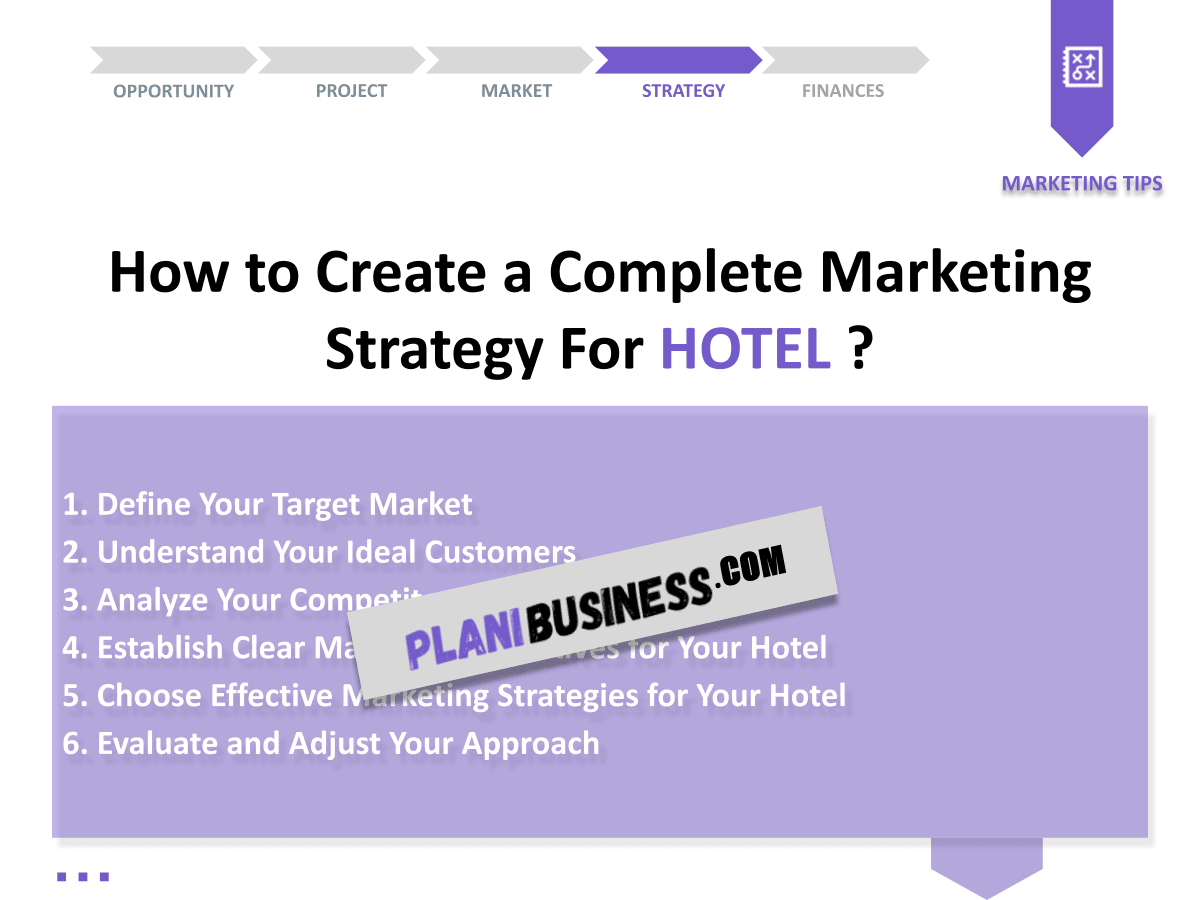Hotel Marketing Plan is crucial for any hotel looking to attract guests and increase revenue. Did you know that 70% of travelers research their accommodations online before booking? That’s a significant number! In today’s digital age, having a robust marketing strategy is essential for success. A Hotel Marketing Plan outlines the strategies and tactics a hotel will use to reach its target audience and achieve its business goals. In this article, we will explore the critical components of a successful hotel marketing plan and provide practical examples to help you get started.
1. Define Your Target Market
| Aspect | Details |
|---|---|
| Demographics | Age, gender, income level |
| Geographics | Location of potential guests |
| Psychographics | Interests, lifestyle, and preferences |
Identifying your target market is the first step in creating an effective Hotel Marketing Plan. You need to understand who your potential guests are and what they are looking for. This will help you tailor your marketing messages to resonate with them.
- Start by analyzing demographic data of your area.
- Consider the types of guests that frequent your hotel.
- Utilize tools like Google Analytics to gather insights.
For instance, if your hotel is located near a business district, your target market might include corporate travelers seeking convenience and amenities. Alternatively, if your hotel is near a tourist attraction, families and leisure travelers may be your primary audience. By defining your target market clearly, you can create targeted marketing campaigns that drive bookings.
2. Understand Your Ideal Customers
| Customer Type | Characteristics |
|---|---|
| Business Travelers | Need convenience and amenities |
| Families | Look for family-friendly options |
| Couples | Seek romantic getaways |
Knowing your ideal customers will help you create personalized marketing strategies. Think about what they value and how your hotel can meet those needs.
- Conduct surveys or interviews with past guests.
- Use social media to engage with your audience and gather insights.
- Analyze booking data to identify trends among your guests.
For example, if you find that many of your guests are couples looking for romantic getaways, you can develop special packages that cater to that demographic. This could include spa services, dinner specials, or romantic room setups. By understanding your ideal customers, you can create targeted marketing campaigns that resonate with their desires and ultimately drive bookings.
3. Analyze Your Competitors
| Competitor | Strengths | Weaknesses |
|---|---|---|
| Competitor A | Strong online presence | Higher prices |
| Competitor B | Excellent customer service | Limited amenities |
| Competitor C | Unique offerings | Smaller room sizes |
Understanding your competitors is vital in crafting your Hotel Marketing Plan. By analyzing their strengths and weaknesses, you can identify opportunities for your hotel to stand out in the market.
- Check their websites for promotions and offerings.
- Read customer reviews to gauge guest satisfaction.
- Monitor their social media activity to see how they engage with guests.
For example, if you notice that a competitor has a strong loyalty program that attracts repeat customers, you might consider implementing or enhancing your own loyalty offerings. Alternatively, if a competitor is known for high prices but lacks certain amenities, you could position your hotel as a more affordable option with comparable or superior services. This competitive analysis is essential for creating a winning Hotel Marketing Plan that addresses market gaps.
4. Establish Clear Marketing Objectives for Your Hotel
| Objective | Measurement |
|---|---|
| Increase bookings by 20% | Monthly booking reports |
| Improve customer satisfaction scores | Guest feedback surveys |
| Boost social media engagement by 50% | Social media analytics |
Setting clear marketing objectives will guide your actions and help measure success. Make sure your goals are specific, measurable, achievable, relevant, and time-bound (SMART).
- Define what success looks like for your hotel.
- Set realistic timelines for achieving your objectives.
- Regularly review your progress and adjust as needed.
For instance, if your objective is to increase bookings by 20%, you might implement targeted advertising campaigns or offer special promotions during peak seasons. By establishing clear marketing objectives, you can focus your efforts and resources on achieving measurable outcomes, making your Hotel Marketing Plan more effective.
5. Choose Effective Marketing Strategies for Your Hotel
| Strategy | Description |
|---|---|
| Social Media Marketing | Engaging content on platforms like Instagram and Facebook |
| Email Marketing | Regular newsletters and promotional offers |
| Search Engine Optimization (SEO) | Improving website visibility in search engines |
Choosing the right marketing strategies is crucial for your Hotel Marketing Plan. Consider where your target market spends their time and tailor your strategies accordingly.
- Utilize social media platforms to showcase your hotel’s unique features.
- Create engaging email campaigns that keep past guests informed about offers.
- Optimize your website for search engines to attract organic traffic.
For example, if your target audience is active on Instagram, you might focus on visually appealing posts that highlight your hotel’s amenities, local attractions, and guest experiences. By choosing effective marketing strategies, you can reach your audience where they are and encourage bookings.
6. Evaluate and Adjust Your Approach
| Evaluation Method | Details |
|---|---|
| Regular Analytics Review | Using tools like Google Analytics |
| Guest Feedback | Surveys and online reviews |
| Performance Metrics | Tracking key performance indicators (KPIs) |
Evaluating your marketing efforts is essential. Use data and feedback to adjust your Hotel Marketing Plan as needed for optimal results.
- Set regular intervals to review your marketing performance.
- Analyze guest feedback to identify areas for improvement.
- Adjust your strategies based on performance metrics and market trends.
For instance, if your analytics show that a particular social media campaign led to a spike in bookings, consider investing more in that channel. Conversely, if certain strategies are underperforming, don’t hesitate to pivot and try something new. This ongoing evaluation process will help ensure that your Hotel Marketing Plan remains effective and relevant.
7. Example N°1 of Marketing Plan for a Boutique Hotel
| Steps | Actions | Details |
|---|---|---|
| 1 | Target Market | Young professionals looking for unique experiences |
| 2 | Ideal Customers | Travelers aged 25-35 |
| 3 | Competitors | Local boutique hotels |
| 4 | Marketing Objectives | Increase brand awareness by 30% |
| 5 | Marketing Strategies | Social media campaigns, influencer partnerships |
| 6 | Evaluation | Monthly performance reviews |
This example illustrates a marketing plan for a boutique hotel aiming to attract young professionals. The key is to highlight unique experiences and create engaging content that resonates with this demographic.
- Develop eye-catching social media posts featuring the hotel’s unique décor and local attractions.
- Collaborate with local influencers to reach a broader audience.
- Monitor engagement metrics to see which posts perform best.
By focusing on these strategies, the boutique hotel can effectively increase its visibility and attract its target market.
8. Example N°2 of Marketing Plan for a Luxury Resort
| Steps | Actions | Details |
|---|---|---|
| 1 | Target Market | Affluent families seeking luxury vacations |
| 2 | Ideal Customers | Families with children aged 5-15 |
| 3 | Competitors | Other luxury resorts in the area |
| 4 | Marketing Objectives | Boost off-season bookings by 25% |
| 5 | Marketing Strategies | Targeted ads, partnerships with travel agencies |
| 6 | Evaluation | Tracking ROI on campaigns |
This example highlights a marketing plan for a luxury resort targeting affluent families. The goal is to enhance off-season bookings by promoting family-friendly amenities and activities.
- Utilize targeted advertising on social media platforms that cater to family travel.
- Collaborate with travel agencies that specialize in family vacations.
- Evaluate the effectiveness of campaigns through ROI analysis.
By implementing these strategies, the luxury resort can attract its ideal customers and drive bookings during the off-peak season.
9. Example N°3 of Marketing Plan for a Budget Hotel
| Steps | Actions | Details |
|---|---|---|
| 1 | Target Market | Budget-conscious travelers |
| 2 | Ideal Customers | Backpackers and solo travelers |
| 3 | Competitors | Other budget hotels in the area |
| 4 | Marketing Objectives | Increase direct bookings by 40% |
| 5 | Marketing Strategies | SEO optimization, online travel agency partnerships |
| 6 | Evaluation | Monthly tracking of website traffic |
This example illustrates a marketing plan for a budget hotel aiming to attract budget-conscious travelers. The focus is on providing value while increasing direct bookings.
- Optimize your website for search engines to improve visibility.
- Collaborate with online travel agencies to reach a broader audience.
- Monitor website analytics to assess traffic sources and booking trends.
By implementing these strategies, the budget hotel can effectively increase its direct bookings and attract more guests looking for affordable accommodations.
10. Example N°4 of Marketing Plan for a City Hotel
| Steps | Actions | Details |
|---|---|---|
| 1 | Target Market | Urban professionals |
| 2 | Ideal Customers | Business travelers and city explorers |
| 3 | Competitors | Other city hotels |
| 4 | Marketing Objectives | Enhance loyalty program sign-ups by 50% |
| 5 | Marketing Strategies | Local events sponsorship, targeted email campaigns |
| 6 | Evaluation | Tracking customer retention rates |
This example showcases a marketing plan for a city hotel targeting urban professionals. The goal is to increase loyalty program sign-ups while promoting the hotel’s convenient location.
- Sponsor local events to engage with the community and attract guests.
- Implement targeted email campaigns to inform past guests about loyalty benefits.
- Evaluate the effectiveness of the loyalty program by tracking sign-ups and retention rates.
By focusing on these strategies, the city hotel can enhance its appeal to urban professionals and foster long-term relationships with its guests.
11. Example N°5 of Marketing Plan for a Resort Hotel
| Steps | Actions | Details |
|---|---|---|
| 1 | Target Market | Vacationing families |
| 2 | Ideal Customers | Families looking for all-inclusive packages |
| 3 | Competitors | Other resorts in the area |
| 4 | Marketing Objectives | Increase group bookings by 30% |
| 5 | Marketing Strategies | Group discounts, family-friendly promotions |
| 6 | Evaluation | Monitoring group booking trends |
This example presents a marketing plan for a resort hotel aimed at vacationing families. The primary focus is on increasing group bookings through attractive packages and promotions.
- Offer special discounts for families booking multiple rooms.
- Promote family-friendly activities available at the resort.
- Regularly assess group booking trends to refine strategies.
By implementing these strategies, the resort hotel can effectively attract families looking for memorable vacation experiences.
12. Example N°6 of Marketing Plan for a Wellness Hotel
| Steps | Actions | Details |
|---|---|---|
| 1 | Target Market | Health-conscious individuals |
| 2 | Ideal Customers | Guests seeking wellness retreats |
| 3 | Competitors | Other wellness hotels |
| 4 | Marketing Objectives | Grow wellness program participants by 25% |
| 5 | Marketing Strategies | Partnerships with health influencers, wellness blogs |
| 6 | Evaluation | Tracking wellness program engagement |
This example illustrates a marketing plan for a wellness hotel targeting health-conscious individuals. The objective is to grow participation in wellness programs and retreats.
- Collaborate with health influencers to promote wellness offerings.
- Utilize wellness blogs to share tips and promote packages.
- Regularly track engagement metrics to assess the success of wellness initiatives.
By executing these strategies, the wellness hotel can attract guests interested in health and wellness, enhancing their overall experience.
13. Example N°7 of Marketing Plan for a Boutique Hotel
| Steps | Actions | Details |
|---|---|---|
| 1 | Target Market | Travelers looking for unique experiences |
| 2 | Ideal Customers | Young couples and solo travelers |
| 3 | Competitors | Local boutique hotels |
| 4 | Marketing Objectives | Increase social media engagement by 50% |
| 5 | Marketing Strategies | Influencer collaborations, experiential marketing |
| 6 | Evaluation | Monthly social media analytics reviews |
This example showcases a marketing plan for a boutique hotel focusing on attracting travelers seeking unique experiences. The goal is to boost social media engagement and brand awareness.
- Engage with influencers to create authentic content about the hotel.
- Host unique events that showcase the hotel’s personality and charm.
- Analyze social media metrics to track engagement and adjust strategies accordingly.
By focusing on these strategies, the boutique hotel can enhance its visibility and attract its ideal customers, ultimately driving bookings and brand loyalty.
Conclusion
In conclusion, creating a robust Hotel Marketing Plan is essential for attracting guests and driving revenue. By understanding your target market, defining your ideal customers, analyzing competitors, and establishing clear marketing objectives, you can develop effective strategies that resonate with potential guests. Remember to continuously evaluate and adjust your approach to ensure your marketing efforts are successful.
If you’re looking to take your planning a step further, consider checking out this business plan template for hotels to help you outline your goals and strategies comprehensively.
Additionally, you may find our articles on How to Kickstart a Hotel? and how to create a SWOT analysis for a Hotel extremely helpful in your journey. These resources can provide further insights into establishing a successful hotel business.
FAQ
- What is a Hotel Marketing Plan?
A Hotel Marketing Plan is a strategic outline that details the marketing efforts and strategies a hotel will implement to attract guests and increase bookings. - Why is a Hotel Marketing Plan important?
A Hotel Marketing Plan is crucial as it helps hotels identify their target audience, set marketing objectives, and create effective strategies to achieve their business goals. - What are the key components of a Hotel Marketing Plan?
The key components include target market analysis, ideal customer profiles, competitor analysis, marketing objectives, and chosen marketing strategies. - How do I identify my target market for a hotel?
Identify your target market by analyzing demographic data, understanding guest preferences, and considering the location of your hotel and its amenities. - What marketing strategies are effective for hotels?
Effective marketing strategies include social media marketing, email marketing, search engine optimization (SEO), and partnerships with travel agencies. - How can I evaluate the success of my Hotel Marketing Plan?
Evaluate success by tracking key performance indicators (KPIs) such as booking rates, customer satisfaction scores, and social media engagement metrics. - What role does social media play in hotel marketing?
Social media plays a significant role in hotel marketing by allowing hotels to showcase their offerings, engage with guests, and build brand loyalty. - How often should I update my Hotel Marketing Plan?
It’s advisable to review and update your Hotel Marketing Plan at least annually or whenever significant changes occur in your business or market conditions. - Can I use a business plan template for my Hotel Marketing Plan?
Yes, utilizing a business plan template can provide a structured approach to creating your Hotel Marketing Plan and ensure that you cover all necessary components. - What are common mistakes to avoid in hotel marketing?
Common mistakes include not understanding your target audience, neglecting online reviews, failing to utilize social media effectively, and not setting measurable objectives.







